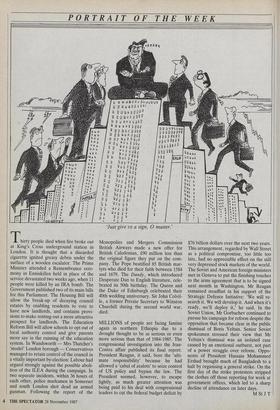PORTRAIT OF THE WEEK
lust give Is a sign, 0 master.'
Thirty people died when fire broke out at King's Cross underground station in London. It is thought that a discarded cigarette ignited greasy debris under the surface of a wooden escalator. The Prime Minister attended a Remembrance cere- mony in Enniskillen held in place of the service devastated two weeks ago, when 11 people were killed by an IRA bomb. The Government published two of its main bills for this Parliament. The Housing Bill will allow the break-up of decaying council estates by enabling residents to vote to have new landlords, and contains provi- sions to make renting-out a more attractive prospect for landlords. The Education Reform Bill will allow schools to opt out of local authority control and give parents more say in the running of the education system. In Wandsworth — Mrs Thatcher's 'model' London borough — Conservatives managed to retain control of the council in a vitally important by-election: Labour had argued strongly against the possible aboli- tion of the ILEA during the campaign. In two separate incidents, within 36 hours of each other, police marksmen in Somerset and south London shot dead an armed gunman. Following the report of the Monopolies and Mergers Commission British Airways made a new offer for British Caledonian, £90 million less than the original figure they put on the com- pany. The Pope beatified 85 British mar- tyrs who died for their faith between 1584 and 1679. The Dandy, which introduced Desperate Dan to English literature, cele- brated its 50th birthday. The Queen and the Duke of Edinburgh celebrated their 40th wedding anniversary. Sir John Colvil- le, a former Private Secretary to Winston Churchill during the second world war, died.
MILLIONS of people are facing famine again in northern Ethiopia due to a drought thought to be as serious or even more serious than that of 1984-1985. The congressional investigation into the Iran- Contra affair published its final report. President Reagan, it said, bore the 'ulti- mate responsibility' because he had allowed a 'cabal of zealots' to seize control of US policy and bypass the law. The President seemed, however, to escape lightly, as much greater attention was being paid to his deal with congressional leaders to cut the federal budget deficit by $76 billion dollars over the next, two years. This arrangement, regarded by Wall Street as a political compromise, too little too late, had no appreciable effect on the still very depressed stock Markets of the world. The Soviet and American foreign ministers met in Geneva to put the finishing touches to the arms agreement that is to be signed next month in Washington. Mr Reagan remained steadfast in his support of the Strategic Defence Initiative: 'We will re- search it. We will develop it. And when it's ready, we'll deploy it,' he said. In the Soviet Union, Mr Gorbachev continued to pursue his campaign for reform despite the opposition that became, clear in the public dismissal of Boris Yeltsin. Senior Soviet spokesmen stressed their view that Mr Yeltsin's dismissal was an isolated case caused by an emotional outburst, not part of a power struggle over reform. Oppo- nents of President Hussain Mohammed Ershacl brought much of Bangladesh to a halt by Organising a general strike. On the first day of the strike protesters stripped the clothes off those reporting for work at government offices, which led to a sharp decline of attendance on later days.
M St J T


































































 Previous page
Previous page